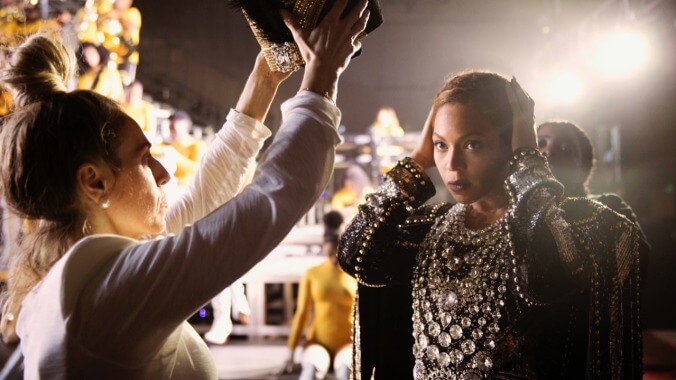Homecoming is an intimate reminder that big wins are hard-fought, even for Beyoncé

“When I decided to do Coachella, instead of me pulling out my flower crown, it was more important that I brought our culture to Coachella.” Though she chuckles warmly at her joke, there is a quiet power couched in Beyoncé’s mission for her historic 2018 festival set, stated roughly 32 minutes into the Netflix documentary Homecoming: A Film By Beyoncé. The idea of carving out a space at the largest music event of the year—one that is not-so-secretly consumed by a predominately white audience—to unabashedly celebrate black culture might ring as too ambitious of an undertaking for most to seriously entertain. But as we witness throughout this vibrant documentary, the journey isn’t exactly for the faint of heart and can be an upward climb for even the most time-tested of legends among us.
To be clear, Homecoming is not your standard concert film by any stretch. Intermittently dispersed between long, seamlessly melded shots of her two headlining weekends in Coachella Valley are intimate behind-the-scenes glances chronicling a months-long conceptualization and rehearsal process. The inspiration for her performance, we quickly learn, stems from her unfulfilled desire to attend and experience an HBCU, a dream ultimately hindered by early success. “My college was Destiny’s Child,” Beyoncé explains in a voice-over, which is simultaneously a stellar flex and a gently heartbreaking reminder of her long-term, devoted relationship with sacrifice. In fact, she takes great care to specify a few things she’s had to forfeit in order to maintain her career and, in particular, her Coachella set—like quality time with her newborn twins Rumi and Sir, as well as the joys of even modest amounts of sugar and carbs. While it’s nothing that is particularly surprising—even those with passing knowledge of Queen Bey understand that she is one of the hardest-working entertainers on the planet—the reminders successfully tug away at a veil that has long outfitted an “effortless”-looking career. It is very easy to fall into the trap of assuming that her talent is simply an innate part of her essence while forgetting the toil and perseverance it took for her to reach this point.
While she speaks frankly of the winding, bumpy road to Coachella—a milestone that was temporarily delayed due to her pregnancy in 2017—it can be, at times, surprising to remember that we are receiving such candid insight from a figure who is so famously private. With few interviews under her belt and a heavily controlled, light social media presence, we are not privy to many details surrounding her civilian life outside of her work. Hell, we rarely receive details about her work. (Speaking of best-kept secrets, have you checked out Homecoming: The Live Album yet?) In Homecoming, however, she opens up about the twins’ difficult childbirth and the toll it took on her body and spirit, which may be new details to anyone who hasn’t had the chance to check out her essay in Vogue.
